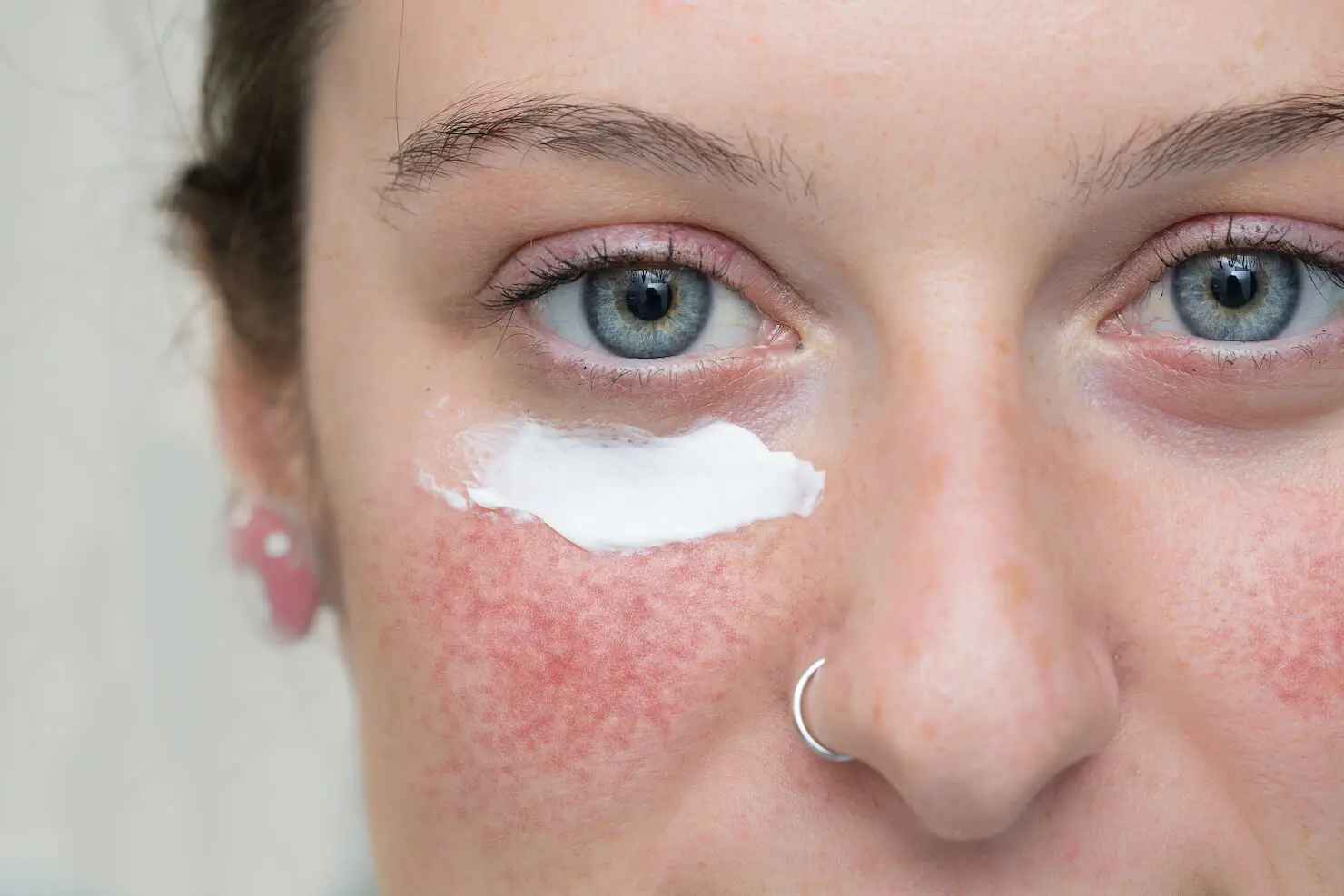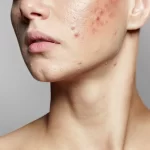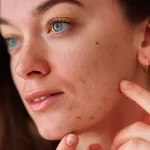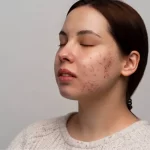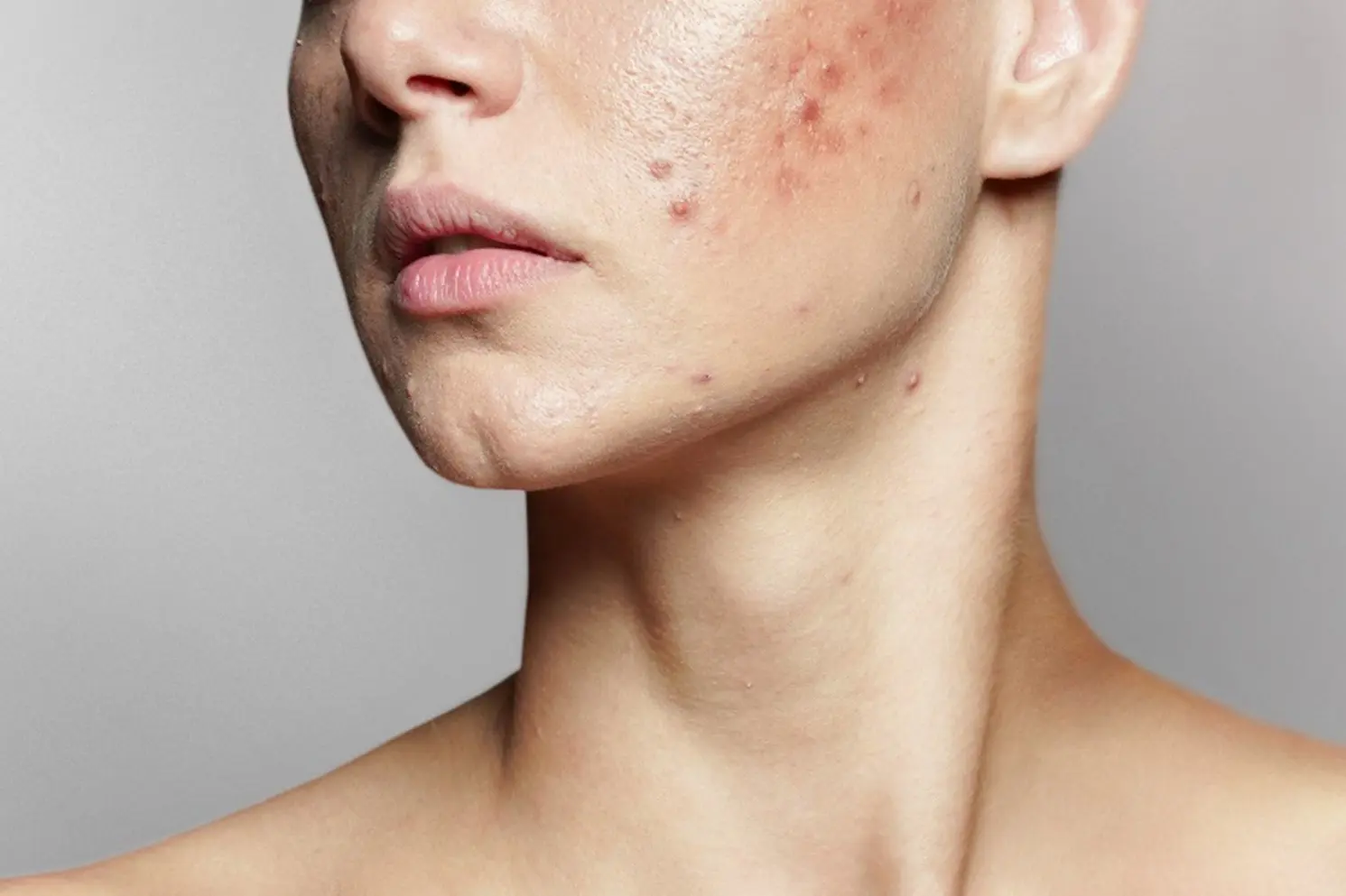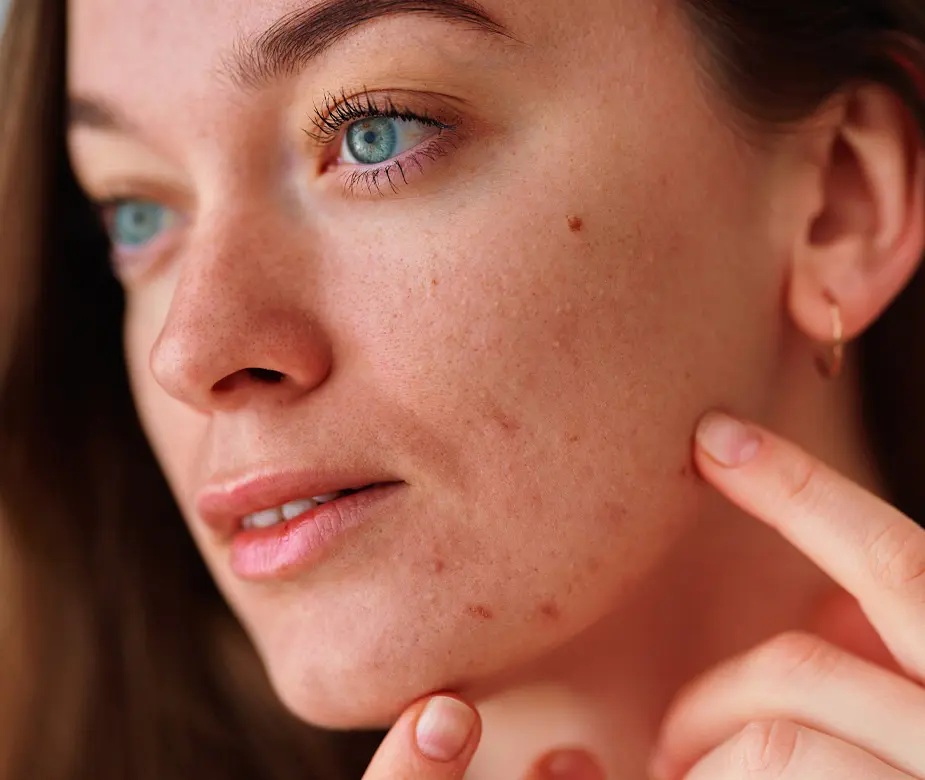A dermatologist-recommended skin care routine for rosacea helps calm sensitive skin and reduce facial redness. Doctors advise washing your face with a mild cleanser, adding a light moisturizer, and finishing with a broad-spectrum sunscreen each morning.
People with rosacea should use rosacea-friendly skin care products that are fragrance-free to avoid irritation. Prescription options like azelaic acid may also help with rosacea symptoms. This skin care routine for rosacea gives a solid base, and more steps can be added if needed.
At DermOnDemand, led by Dr. Alicia Atkins, patients get quick access to expert care for skin conditions. Rosacea treatment needs personal care, and a dermatologist-recommended skin care routine for rosacea can reduce flare-ups and protect sensitive skin.
This guide shares daily steps, product tips, and treatment choices backed by dermatologists.
Key Takeaways
- A dermatologist-recommended skin care routine for rosacea includes gentle cleansing, daily moisturizing, and broad-spectrum sunscreen to reduce flare-ups.
- People with rosacea should choose fragrance-free, rosacea-friendly skin care products and avoid harsh ingredients like alcohol-based toners or scrubs.
- Prescription treatments such as azelaic acid, ivermectin, or metronidazole can help manage moderate rosacea symptoms when basic care is not enough.
- Makeup products labeled for sensitive skin, especially green-tinted primers, can safely reduce the appearance of facial redness.
- Lifestyle changes such as avoiding hot drinks, spicy foods, alcohol, and sun exposure also play a key role in controlling rosacea symptoms.
Best Rosacea Skin Care Regimen
Daily routine recommended by dermatologists
Dermatologists recommend keeping a skin care routine for rosacea simple, gentle, and consistent. Each step protects the skin barrier, lowers redness, and reduces the chance of a rosacea flare. A full routine has three main parts: cleansing, moisturizing, and sun protection. Extra steps, like makeup or prescription creams, are added only when needed.
Cleansing: Wash your face with lukewarm water once or twice a day. Avoid hot water, which can trigger rosacea symptoms. Use a fragrance-free cleanser made for sensitive skin.
Many dermatologists suggest cream or lotion cleansers because they are less drying than foaming types. Gentle skin care helps prevent irritation and supports long-term rosacea treatment.
- CeraVe Hydrating Cleanser – a gentle, fragrance-free cream cleanser with ceramides and hyaluronic acid, safe for sensitive skin.
Moisturizing: After cleansing, apply a calming moisturizer. Look for ingredients like ceramides, hyaluronic acid, or niacinamide, which strengthen the skin barrier.
Moisturizers for rosacea-prone skin should be light, non-comedogenic, and free of alcohol or perfume. A good moisturizer reduces facial redness and improves comfort.
- La Roche-Posay Toleriane Double Repair Face Moisturizer – lightweight, non-comedogenic, and formulated with ceramides and niacinamide to calm rosacea-prone skin.
Sun protection: Sunlight is one of the top triggers for rosacea. Every morning, apply a broad-spectrum sunscreen with SPF 30 or higher. Mineral sunscreens with zinc oxide or titanium dioxide are often the best skin care for rosacea because they are less irritating. Reapply during the day if you spend time outdoors.
- EltaMD UV Clear Broad-Spectrum SPF 46 – a mineral-based sunscreen with zinc oxide and niacinamide, designed for sensitive or rosacea-prone skin.
Optional steps: If you wear makeup, choose rosacea-friendly skin care products that are labeled non-comedogenic and safe for sensitive skin. Green-tint primers or concealers can help hide redness without stressing the skin.
- Eucerin Redness Relief Green Tint Day Cream – a green-tinted, fragrance-free product that helps reduce visible redness while protecting the skin.
For people with rosacea who need extra help, dermatologists may add prescription options such as azelaic acid, ivermectin, or metronidazole. These target bumps and reduce inflammation.
By following these steps, people with rosacea can control symptoms and prevent flare-ups. A dermatologist-recommended skin care routine for rosacea focuses on fewer products, gentle choices, and steady use over time.
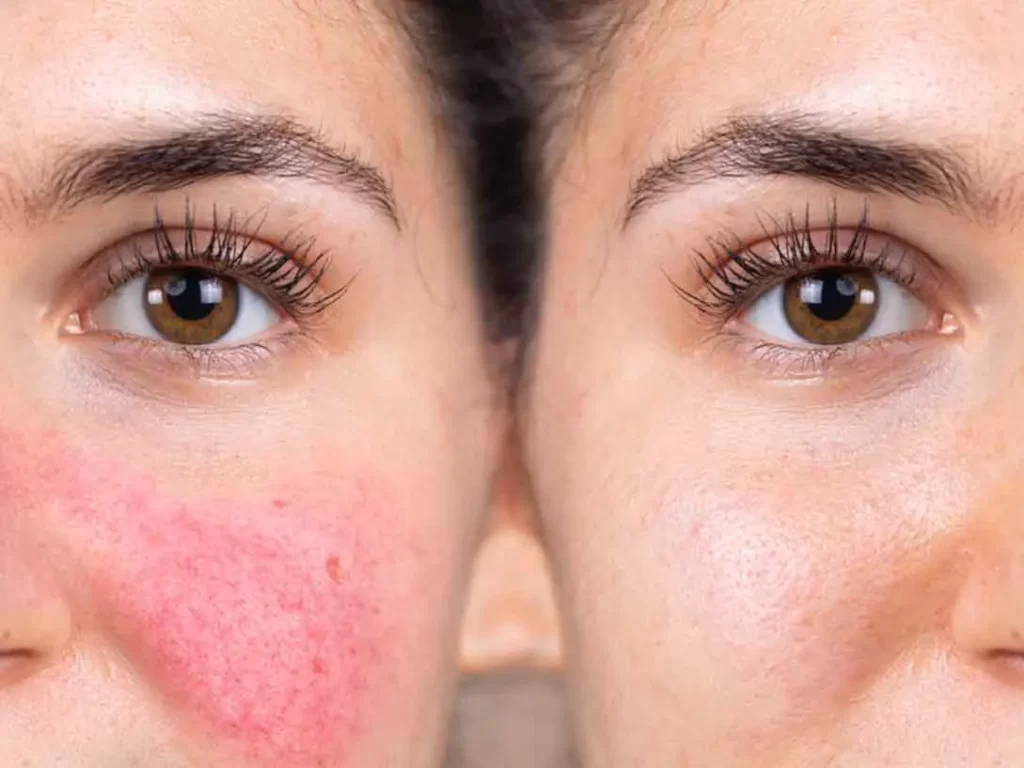
Understanding Rosacea and Why Skin Care Matters
Rosacea is a skin condition that causes facial redness, visible blood vessels, and irritation. The National Rosacea Society explains that it can range from mild redness to more serious flare-ups. People with rosacea often find that common products make their skin worse.
Rosacea-prone skin has a weak barrier and reacts fast to irritants. Gentle skin care helps prevent flare-ups and makes rosacea treatment work better. Taking care of the skin each day helps keep symptoms under control.
Rosacea and acne: combined care tips
Some people with rosacea also get acne-like bumps. For these cases, dermatologists may suggest azelaic acid, which calms bumps without making facial redness worse. Harsh acne drugs are avoided since they can trigger rosacea symptoms. A balanced plan helps both conditions improve.
Products and ingredients to avoid
Stay away from alcohol-based toners, scrubs, or strong exfoliants that irritate sensitive skin. Avoid hot water, menthol, and fragranced makeup products. Choose fragrance-free and rosacea-friendly skin care products labeled for sensitive skin.
Dermatologist-Recommended Products for Rosacea
Best face products for rosacea
The best face products for rosacea are simple: mild cleansers, gentle moisturizers, and mineral sunscreens. La Roche Posay is one brand often suggested because its rosacea-friendly skin care products are tested for sensitive skin. Even the best face products for rosacea should be used in a steady, simple routine.
Natural rosacea skin care products
Natural products may help calm rosacea symptoms if chosen with care. Aloe vera and niacinamide are often safe options. Still, “natural” does not always mean safe, so people with rosacea should test new items first and always choose fragrance-free products.
Best anti-aging options for rosacea sufferers
For anti-aging, avoid harsh acids or strong retinoids. Dermatologists suggest peptides, ceramides, and hydrating ingredients that support skin without causing rosacea flare. Green tint creams or primers can cover redness while protecting sensitive skin.
Dermatologist Treatment Options for Rosacea
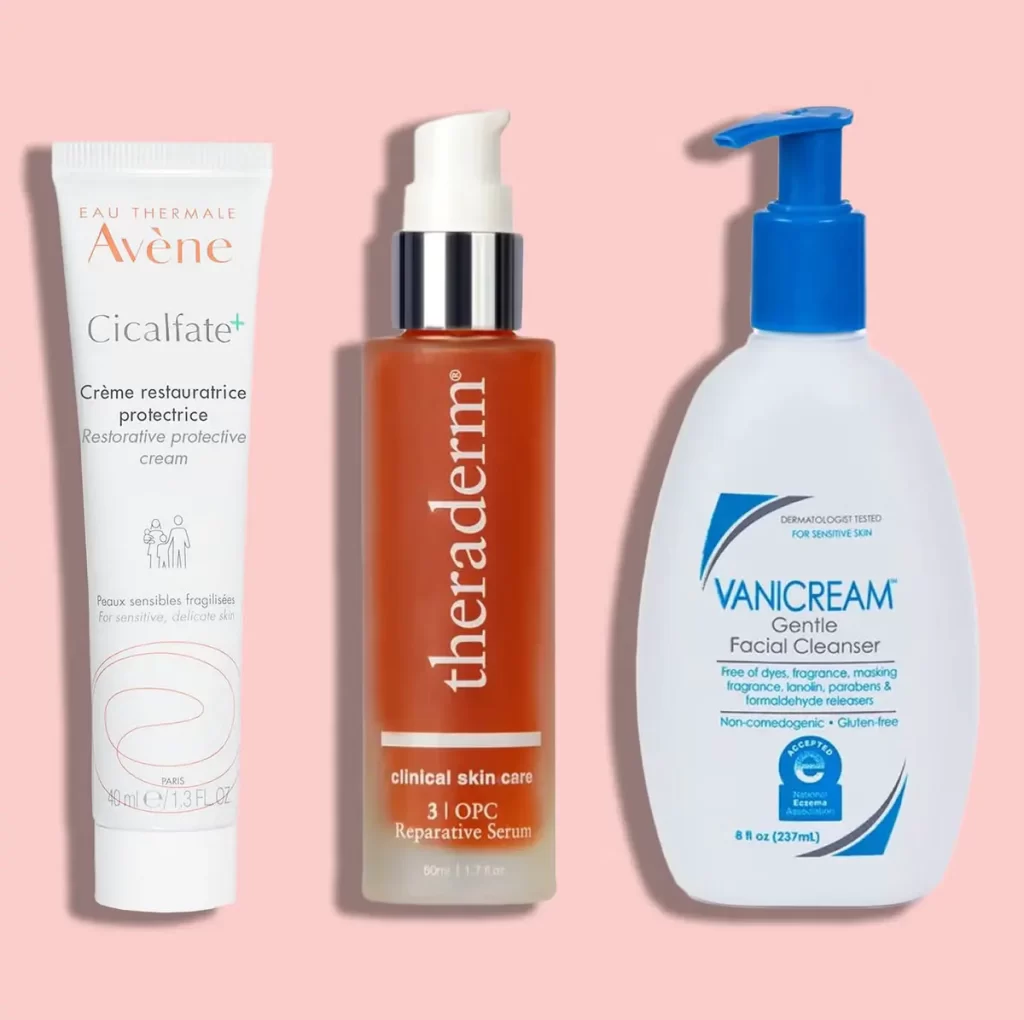
Best prescription creams for rosacea
For stronger cases, dermatologists may prescribe topical rosacea treatment. Options include azelaic acid, ivermectin, and metronidazole. These creams help calm bumps, redness, and other rosacea symptoms. DermOnDemand provides digital-first access to plans made by experts like Dr. Alicia Atkins, giving patients trusted care fast.
Professional treatments and long-term results
Dermatologists may also use lasers or light therapy to treat visible blood vessels and facial redness. These treatments last longer than over-the-counter products.
Can rosacea be cured permanently?
Rosacea has no permanent cure. Still, with a dermatologist-recommended skin care routine for rosacea and medical treatment, flare-ups can be reduced and controlled. The goal is steady, long-term comfort.
Lifestyle and Habits to Reduce Flare-Ups
Daily choices affect rosacea symptoms. Triggers often include hot drinks, spicy foods, alcohol, and stress. Keeping a journal of flare-ups helps patients avoid personal triggers. Protecting the skin from the sun and extreme weather also lowers risk. For more on how nutrition influences these flare-ups, read about diet’s role in rosacea.
When to Seek a Dermatologist’s Care
See a dermatologist if over-the-counter care is not enough, or if facial redness and bumps affect daily life. A doctor can confirm the diagnosis, suggest safe rosacea-friendly skin care products, and prescribe the best rosacea treatment. With DermOnDemand, patients can connect with Dr. Alicia Atkins and her team for fast, private, and expert care.


